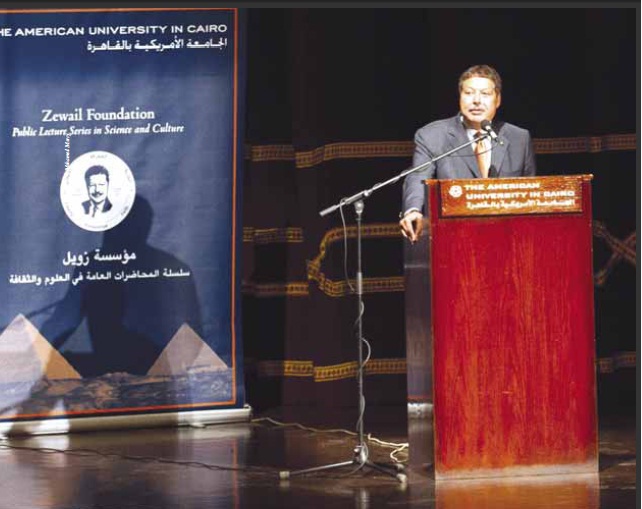

The Zewail City of Science and Technology
promises the rebirth of a scientific renaissance in Egypt
With Egypt at a crossroads,
all eyes are turned toward
drafting a roadmap for
establishing democratic rule, restoring
order, maintaining stability, jumpstarting
the economy and removing the
remnants of the Mubarak regime.
Ahmed Zewail, Nobel laureate, Caltech
professor and AUC trustee, has chosen
to make a difference through science by
establishing the Zewail City of Science
and Technology: Egypt's National
Project for Scientific Renaissance.
"The only path to building a
positive future for Egypt is by
restructuring the educational and
scientific research realms," he said,
speaking at AUC Tahrir Square to an
overflowing Ewart Memorial Hall last
summer. "Nobody has the complete
answer to what constitutes proper
education, but we need a clear vision
for a modern educational system that
will raise the efficacy of the Egyptian
individual. And that's where the role of
the Zewail City of Science and
Technology comes in."
An independent, nonprofit organization, the project was met with enthusiasm by the ruling Supreme Council of Armed Forces and Prime Minister Essam Sharaf. The project was initially proposed by Zewail in 1999, when he received the Nobel Prize in chemistry, and was approved by the Mubarak government, but no action had been taken to advance it. Today, more than a decade later, Zewail's dream is coming to life. "Now, the climate is right; I'm optimistic," Zewail said.
The institution, an integrated city
for education, research and
development, will offer undergraduate
and graduate programs in a variety of fields, including medicine, materials
science and engineering. A state-ofthe-
art technology park, several
technology pyramids and seven
centers of excellence will also be
established. Bringing together top
researchers and scientists from around
the world, the institution will act as a
think tank, evaluating large-scale
national projects and making its
findings accessible to policymakers.
In addition to science, there will also
be cultural and literary activities.
"When the project is completed, what we need is discipline and hard work," Zewail noted. "Just as Japan was able to overcome the nuclear crisis that was about to eradicate the country altogether, we should all take part in civilian life to build our new Egypt. The most important thing is to do things right."
To ensure institutional independence,
a board of trustees with members from
the local and international communities
was formed. These include six Nobel
laureates, a group of finance specialists,
as well as leading scientists such as
presidents of the U.S. National
Academy of Engineering, the
California Institute of Technology and
the Chinese Academy of Sciences. The
board also includes well-known figures
such as Sir Magdi Yacoub, prominent
heart surgeon and founder of the heart
center in Aswan; Mohamed Ghoneim, a renowned urology physician; and
Mostafa El-Sayed, leading researcher
and professor at the Georgia Institute of
Technology, among others. "The
differentiating factor here is scientific
achievement; no wasta [favoritism]," said
Zewail. "We are looking for serious
researchers who can make a difference."
The preliminary budget for the
project is $1 billion for endowment
and $1 billion in cash, Zewail said.
A fund has been set up, accepting
donations via a unified account
(10001000) across all banks in Egypt.
Afterward, donations will be sought from other Arab countries and abroad,
including the European Union, China
and the United States. "This national
project is characterized by
administrative and financial
independence, and we chose to first
set up the fund in Egypt to prove that
Egyptians are serious about this
initiative and are capable of creating
their own national scientific
renaissance," Zewail affirmed. "The
first word of the Quran revealed to
Prophet Muhammad was 'Read,' and
the project's fund carries the same
name, which stands for Renaissance in
Education And Development."
Zewail drew parallels with the nahda,
or cultural renaissance, that began in
the late 19th and early 20th centuries in
Egypt during the reign of Muhammad
Ali, who saw education at the core of
any reform movement. "This nahda
gave Egypt profound influence on the
Arab world, but we can't keep living in
the past," Zewail said. "The world is
moving at a fast pace, and today's
Egyptian renaissance will only come
about through scientific research."
Affirming his belief in his
countrymen, he added, "We don't have
enough resources such as petroleum as
is the case in other countries, but we
do have 85 million Egyptians, and the
future of Egypt will be built at the
hands of those Egyptians. … Change
will happen sooner than you think. I
have complete confidence in Egyptians,
who have always made history."
By Dalia Al Nimr